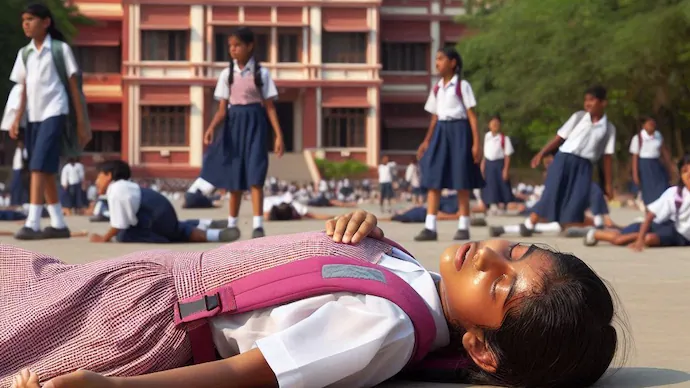In recent days, the extreme heatwave sweeping across Bihar has resulted in several students fainting in schools across at least three districts. Officials reported that on Wednesday, numerous students lost consciousness due to the blistering heat, with Bihar recording an all-time high temperature of 47.7 degrees Celsius in Aurangabad. Daytime temperatures have soared past 44 degrees Celsius in many parts of the state, prompting concerns for the well-being of both students and teachers.
Bihar Chief Secretary Brajesh Mehrotra convened a high-level meeting to address the crisis, aiming to assess the preparedness of various departments in response to the extreme heatwave conditions. Pratyaya Amrit, the Additional Chief Secretary of the Disaster Management Department, emphasized the urgency of the situation and the need for immediate preventive measures.
Suresh Prasad, the Headmaster of a middle school in Sheikhpura district, shared that around 6-7 students fainted during morning assembly prayers. Similar incidents were reported in Begusarai and East Champaran districts. Tejashwi Yadav, RJD leader and former Deputy Chief Minister, called on the state government to take the matter seriously and implement measures to protect children from the harsh conditions, criticizing the decision to keep schools open despite the severe heat.
Amidst these heatwave challenges, KK Pathak, the Additional Chief Secretary of Bihar’s Education Department, continues to make headlines for his stringent policies and authoritative decisions. Pathak has been actively inspecting schools and taking decisive actions against negligent teachers, often causing a stir within the education ministry. His direct reporting line to Chief Minister Nitish Kumar grants him significant autonomy, allowing him to make impactful decisions without interference from Education Minister Chandrashekhar.
Pathak’s authority includes suspending or dismissing teachers and principals, withholding salaries, recommending fund releases, and altering school timetables and holiday schedules. His initiatives, such as ‘Mission Daksh,’ aim to improve educational outcomes by assigning teachers to mentor academically weak students. However, his policies have also led to controversies, such as the enforcement of strict attendance rules for students and teachers and the reduction of holidays.
Teachers in Bihar have expressed significant distress due to Pathak’s policies, particularly during the heatwave. Schools are closed for students, but teachers are still required to attend, enduring the oppressive heat and humidity. This requirement has been seen as an unnecessary and harsh measure, impacting the mental and physical well-being of educators.
Interviews conducted by the Oligo team revealed widespread dissatisfaction among teachers. They highlighted the upcoming summer vacation, during which students will be off for a month while teachers are expected to continue working. This scenario is viewed as punitive and counterproductive to the educational mission.
Comparative feedback from teachers working under international boards such as the Cambridge Board and the International Baccalaureate (IB) underscores the stark difference in working conditions. In IB-affiliated schools, both teachers and students enjoy supportive environments with appropriate measures taken during extreme weather conditions. These institutions recognize the mutual impact of such conditions on both students and teachers.
Pathak’s policies stand in stark contrast to international standards and violate principles upheld by labor organizations. The stringent measures imposed on Bihar’s teachers are seen as unjust and harmful to their professional and personal well-being. There is a growing call for a reevaluation of these policies to ensure a fair and supportive working environment for educators.
As Bihar continues to grapple with the extreme heatwave and the stringent educational policies under KK Pathak, the need for balanced and humane solutions becomes increasingly evident. The well-being of teachers and students must be prioritized to create a conducive learning environment that fosters educational growth and development.

